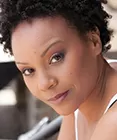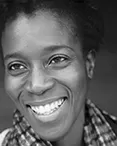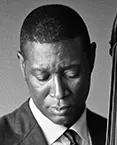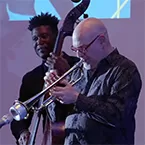Adapted by Nambi E. Kelley
Based on the book by Toni Morrison
Directed by Awoye Timpo
Music by Marcus Shelby
Choreography by Joanna Haigood
Harlem, 1926. The city overflows with Jazz. Folks move with musicality, and speak rhythms, and in the heart of it all is Violet—a middle-aged woman set on revenge. Her husband’s affair with a beautiful young woman sets off a series of violent events and unforgivable acts. Adapted from Toni Morrison’s stunning novel and musically underscored by Bay-Area jazz musician Marcus Shelby—Jazz is a theatrical composition. Peeling back layered accounts and alternating perspectives expose ultimately sympathetic characters, who—like the growing New York neighborhood and the winding woods of their youth—reveal their own rhythms.
Run time is approximately 1 hour and 40 minutes with no intermission.
Generous support for Jazz provided by The Shubert Foundation, William & Flora Hewlett Foundation, Venturous Theater Fund of the Tides Foundation, the Dramatists Guild Foundation and the National Endowment for the Arts.
Special effects advisories TBD. MTC provides advisories for each production regarding special effects that may affect patron health and physical sensitivities. MTC does not provide advisories relating to content, because content sensitivities vary from patron to patron. If you have questions about content, please contact the box office prior to purchasing your tickets as we do not offer refunds to patrons who choose not to see a show based on subject matter.


























Jazz
As mourners audibly sob and somewhere a choir sings the gospel hymn “Steal Away,” a stunned-looking, steely-eyed woman approaches the rectangle of flowers guarding the unseen corpse of the young girl whose portrait we see near-by. With increasing snarl, she hisses, “Look at that face ... Cream at the top of milk-pail face ... That sneaky face.” And with that, she draws a knife and slashes downward to the horrored gasps of those gathered to mourn, slashing the dead girl’s serenity.
From that desperate plunge of the blade in the spring of 1926 in New York’s Harlem comes pouring waves of memories that call and answer to each other like the instruments playing the background, bluesy jazz music that underscores their appearances before us. The revengeful act of this woman, Violet, is targeted at the young lover, Dorcas, of Violet’s unfaithful husband, Joe, after he shot the girl in his own act of crazed jealousy. We soon learn that these acts of violence have many, complicated, often-sad, intertwining events and causes behind them – some going back many years prior.
In Marin Theatre Company’s achingly stunning, grippingly engaging West Coast premiere of Nambi E. Kelley’s Jazz – a 2017 adaptation of Pulitzer and Nobel Prize-winning Toni Morrison’s 1992 historical novel by the same name – the memories and the subsequent events of Violet’s rashness proceed in a style much like that of the play’s and book’s title, Jazz. With each encounter of the story taking on an air of improvisation; with parallel scenes that both blend and clash in duet, and with words that musically flow alternatively in harsh staccato and in long, hypnotic extensions, Awoye Timpo directs Jazz to a beat that mirrors the new music form that was sweeping through the streets of the 1920’s Harlem that Nambi E. Kelley’s play visits.
C. Kelly Wright heads an all-star cast as the emotionally erratic but determinedly focused Violet who is in search for answers as to who was this girl that her husband loved and led him on a life-erupting, wanderlust venture. Her Violet recalls the memories of her earlier times in Vesper County, Virginia where life was particularly hard for all African Americans as whites were seeking their revenge and their sickening paybacks for their losses of the Civil War and their free-labor slaves. It was there as a girl-turning-woman she flat-out resolves to her grandmother, True Belle, (Margo Hall) to have “no babies” and to “find me a job, a man, and forget watching mama in that well” – the last a memory Violet fights to escape of her mother’s tragic death. C. Kelly Wright commands the part of Violet with such incredible finesse and interpretation that every snippet of a Virginia memory or of a current, Harlem moment is gigantic in its powerful, oft-arresting effect.
Her Violet plays out more than once in a stage memory the first time she met Joe Trace – an introduction after he either fell-out or purposefully jumped out (according to whose version we believe) of a tree almost to crush his target – the beautiful, young Violet. Joe was perched there trying to catch a glimpse of his mind-deranged mother, Wild, who had abandoned him and who now roamed like an animal the Virginia countryside. The memories of that first encounter and the night that follows erotically come to life in a blues-filled, body-pumping dance that leaves no doubt of the love Violet and Joe once had.
Michael Gene Sullivan continues his Bay Area reputation for award-winning performances as he captures the rough and raw essence of his Joe Trace. We are initially and magnetically drawn to Joe for his life-loving zeal and passion for his young wife as she recalls their hard-life but happy-together days in Virginia and their move to a heaven-sounding Harlem where he has told her there are “whole streets where Negroes own their own houses.” But his Joe is also a man for whom we come to have strong aversion as he begins to fawn over and then paw with roaming hands the naively willing and encouraging Dorcas (Dezi Solèy) – a teen who is too caught up in Harlem’s rich and lusty music as she acquiesces too easily to a man more than twice her age.
Ms. Solèy’s own performance is both mesmerizing and maddening to watch as we see the young Dorcas play so sweetly and literally into the roaming hands of the near-drooling Joe. (In a stroke of casting genius, Dezi Solèy also plays the mother, Wild, that Joe earlier has manically sought.) Once deceased, her Dorcas becomes a living, forward-staring portrait to whom Violet continually rants and raves but from whom Violet so wants answers and understanding.
Besides True Belle, Margo Hall is distinctively strong-jawed and open-hearted as the aunt named Alice who raised Dorcas. After Dorcas’s demise, Alice frequently finds herself both answering the door and the trying to escape the pounding of questions as Violet repeatedly arrives seeking answers about her victim. But in a dose of solace and friendship that clearly surprises even her, Dorcas’ blunt, strong-willed Aunt begins to take an increasingly sympathetic turn. Brava to Margo Hall for a superbly fine performance.
Like a jazz number that jumps suddenly in tempo, lead instrument, and musical perspective, so does Nambi E. Kelley’s Jazz. We hear accounted viewpoints through the titillating gossip and confidently held opinions of Malvonne, played with hands firmly on hips and eyes seeing all by Lisa Lacy. Tiffany Tenille is Dorcas’s young friend Felice (among other roles), who – when finding time to chatter with Dorcas – adds a faster beat and snappy steps to the tale’s music-like telling. Dane Troy steps into a variety of roles both in Virginia and in Harlem, most notably as the fast-dancing, totally jazz-jiving Acton, a teenage boy who awakens Dorcas out of her Joe-induced slumber some might call a nightmare.
Accompanying and often comforting Violet throughout her memory search for answers of her manic questions of who, what, and why is Parrot – a once-gift from Joe who has an omnipresence in both her knowing looks and her songs of understanding as she sits perched to the side onstage. Paige Mayes projects uncanny, birdlike ability with her slight head cocks, her bill-shaped pursing of lips, and her piercing but humor-filled eyes that see what the humans around her are mostly missing. Her lyrical voice sings in a variety of period styles with snippets of songs that give telltale signs of her avian intuition of seeing the truth behind the love and the lust as well as the tears and the torments occurring around her.
Director Awoye Timpo allows the dreams and realities to mix and blur on a mostly blank, raised stage designed by Kimie Nishikawa. The wooden stage’s surrounding steps become resting spots for cast members as they pause in their parts of the story-telling to watch the scripted solos or duets occurring around them – much like players in a jazz band watch as a drummer or sax player takes off on a musical journey while the others just take it in. Lighting by Jeff Rowlings adds its dreamy effects against a scrim-curtained backdrop and its own flairs of colorful embellishments in swirling, feathery twirls in the above, recessed ceiling. Gregory Robinson’s sound design chimes in for effects both here-and-now and ethereal. Joanna Haigood’s choreography brings the joy of a broom-jumping wedding in Virginia and the sexy and wild innovations of Harlem’s 1920s. And the ongoing fusion of times, places, moods, and memories receives a pallet of clarity through the wide range of costumes deliciously designed by Karen Perry that range from the night-club wild to the Sunday, go-to-church proper.
Underlying the play is a score composed and orchestrated by San Francisco’s jazz artist extraordinaire, Marcus Shelby. He leads no less than twelve talented musicians (including one vocalist, Jamie Zimmer) in jazz and blues enriched background music, produced as a recording by Eric Moffat.
Besides the fascinating, haunting storyline of Nambi E. Kelley’s adapted Jazz, there is a parallel telling of important history of both the post-war South of the early twentieth century and of the early days of African Americans changing the course of musical and American history in the 1920’s Harlem. There is also a strong theme of the resilience, strength, trials, and triumphs (even if small and temporary) of the African American women of the period. Each of the women portrayed on the Marin stage is a particular portrait of a girl or woman who is figuring out or has long-ago figured out how to survive, stay actively alive (even as a ghost), and in her own way thrive in the oft-messed-up (by men) world around her. For me, those portrayals are the real beauty and will likely be my lasting memory of this must-see production of Jazz.
Rating: 5 E, MUST-SEE
Toni Morrison novel hits the stage in MTC’s ‘Jazz’
Like the Toni Morrison novel on which it’s based, Nambi E. Kelley’s new play “Jazz” at Marin Theatre Company is well named. It’s lyrical and nonlinear, sometimes seemingly free-form and full of repeated riffs. It also has a compellingly jazzy score composed by Marcus Shelby, resident artistic director of SFJAZZ.
It’s a welcome return to MTC for playwright Kelley, whose adaption of Richard Wright’s “Native Son” played there in 2017, and whose Greek tragedy remix “Xtigone” premiered at San Francisco’s African-American Shakespeare Company in 2015.
Kimie Nishikawa’s fascinating set is dominated by a huge skylight perched at an angle, suggesting the raised lid of a coffin, with a small plot of flowers below. And indeed, the play starts with a funeral and moves backward and forward from there.
Set in Harlem in the 1920s, “Jazz” is the story of Violet (C. Kelly Wright, compellingly twitchy and haunted), who was so incensed when her husband killed his young lover that she attacked the corpse at her funeral. She becomes so obsessed with this dead teenage girl that she hangs her photo up in their house and keeps going around to visit the girl’s aunt (Margo Hall, prim and no-nonsense) to ask questions about her, resenting her all the while.
And indeed, the deceased Dorcas does gradually become more real in Dezi Solèy’s rivetingly engaged and alive portrayal, evolving from an impassive presence sitting behind a screen in the pose of her portrait to slyly confident temptress to simply a very, very young woman with a too-long-thwarted thirst to taste life.
Michael Gene Sullivan is a lost and broken man as Violet’s husband, Joe, almost sleepwalking through his days, and it’s striking to see how transformed the young charismatic and sliver-tongued Joe is in flashback scenes.
The narrative is densely poetic and free-flowing, frequently shifting perspectives and moving back and forth in time. Increasingly it keeps revisiting some of the same scenes from different people’s perspectives.
At first those perspective shifts are disorienting and it takes a while to register that that is what’s happening, because the play as a whole is so rooted in Violet’s desperate attempts to grapple with and process what happened, and we never get as much inside anyone else’s head as we do in hers. We simply see scenes replayed as other people might have perceived them, framed by other scenes with that character to put them in context.
Some shifts work better than others. Bits of Violet’s and Joe’s youth before they met are so fragmentary and confusing that they seem hardly worth including.
Having a parrot as a sometime narrator and constant observer is an interesting idea, and Paige Mayes brings a lot of presence to the role in a metallically shiny particolored suit (snazzy costumes by Karen Perry), but ultimately she isn’t given much to do.
Director Awoye Timpo handles the narrative’s fluidity gracefully and with lovely theatricality in MTC’s West Coast premiere, as if the play is a sort of dance. (And there is some wonderfully lively dancing in the play, choreographed by Joanna Haigood.)
The ensemble shifts deftly between a number of roles, even if a lot of those characters are so hastily and roughly sketched in the play that we don’t get much of a chance to figure out who they are. Dane Troy is particularly amusing as a vain and controlling dancer. Tiffany Tenille gives Dorcas a handy sounding board as best pal Felice, and Lisa Lacy is full of knowing disapproval as a neighbor.
Certainly some clarity is lost in translation from page to stage, and there are occasional slow patches in the show’s 100 minutes without intermission, often corresponding to how far back the flashbacks go. As dramatic as Violet’s obsession is, it takes a while for the audience’s desire to unearth what happened to come anywhere near to matching her own.
As the picture becomes clearer, however, it also becomes more gripping, and the show’s conclusion is as rewarding as it is refreshing. Even if not everything quite seems to fit in the composition, this “Jazz” comes together into a sweet song before it’s done.